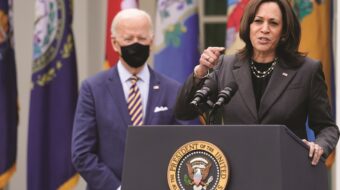AFL-CIO Secretary-Treasurer, Richard Trumka, has drawn a line in the sand on health care reform, saying that Congress must include a strong public plan option in the final bill in order for labor to back it.
He drew his line at a pre-Labor Day press conference with the federation’s other two officers – retiring President John J. Sweeney and Executive Vice President Arlene Holt Baker. Trumka said the public option was a must because it is the only way to compete with the private insurance companies and give consumers the benefits of cost cutting competition.
Trumka said that the final legislation must also be a bill that does not tax any of the benefits workers currently receive on the job and that it must also require employers to cover workers.
“The public option is an absolute must,” Trumka said. “You have to have an employer mandate. And you can’t tax employees to pay for it. That means we won’t support the bill if it doesn’t have the public option in it. Without those three things the present system goes on and on and on.”
Trumka’s remarks came as lawmakers prepare for a Sept. 7 return to the nation’s capital from their August recess, ready to tackle health care again.
The insurance industry, the GOP and the radical right organized highly financed chaos at town hall meetings across the country at the beginning of the recess. Labor and its allies led a groundswell of opposition to the right wing chaos and one by one, took back the town halls. There were mass demonstrations in favor of health care reform all over the country and the momentum in support of reform continues to grow .
Only a day before Trumka drew his line in the sand a large bus that AFSCME, the AFL-CIO’s largest union, had driving across the country to build support for health care reform, pulled back into the nation’s capital. The bus stopped in 20 cities for health care reform rallies held in each of them.
Workers lined up to board the bus where they used computers and a mini-phone bank to call their representatives.
During August unions organized workers to make 200,000 phone calls and write 250,000 letters to Congress, demanding health care reform.
The three labor leaders also used the press conference to push for passage of the Employee Free Choice Act, legislation designed to level the playing field between workers and bosses in union organizing and bargaining.
Supporters of the bill are working to get the 60 votes needed in the Senate to break a planned republican filibuster against it.
That problem and the fight over health care pushed the Employee Free Choice back on the Senate’s schedule.
When questioned about a timetable for a vote on the labor law Sweeney said, “Both the Democratic leadership and Obama have made it clear they want to take up health care reform first.” Quietly, away from the mike, he added, “We’d take up EFCA yesterday.”
Sweeney and his fellow officers said the final version of the EFCA, like the final version of the health care bill, must satisfy three basic principles: Giving workers the right to form or join unions free of intimidation, harassment and law-breaking, a set procedure guaranteeing that once the union is recognized there will be a contract between the two sides within a specific time period, and big fines for those who flout labor law.
Big business has opposed most strongly two sections of the Employee Free Choice Act. One is the “majority sign-up” provision that automatically recognizes unions once a verified majority of workers sign election authorization cards and the other is the section that requires binding arbitration when the two sides can’t agree on a contract within 120 days.
Sweeney made no secret of labor’s displeasure with the activities of numerous lawmakers involved in crafting some of the so called “compromises” on health care
Senate Finance Committee Chairman Max Baucus, D-Mont., has been trying to draft one with two other Democrats and three Republicans. His group has ended up being widely viewed as stalling the entire legislative process for passage of a good bill.
Expressing anger about Baucus and other Blue Dog Democrats seen as stalling on health care, one union, the Sheet Metal Workers, announced it will not fund any candidates this year and will instead put all its funding into the struggle for health care.
When asked Sweeney said, at the press conference, that in “due time” the AFL-CIO Executive Council could consider doing the same thing.
Trumka also warned, in stronger terms than he has done so far, that lawmakers who cross labor on health care could pay the penalty at the polls next year.
“We will tell our members the truth,” Trumka declared. “Who stood with them, and who wanted to make the insurance companies happy, versus who wanted to make Americans healthy.”












Comments